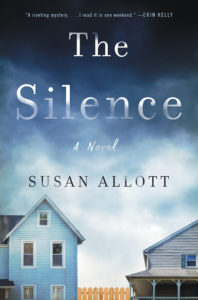Are there any positives to publishing in a pandemic?
It’s easy, at first glance, to find silver linings in the midst of the COVID-19 pandemic. Writing from inner London, I can report that the sun is shining, there are no planes in the sky; I can take my daily walk down the centre of the road if I choose to, such is the lack of traffic. The only sound from my open kitchen window is birdsong and a distant lawnmower. It feels like someone took a look at the state of our planet and pressed pause, forcing us to consider what we truly value, what we might do differently if we want to survive. But the economy doesn’t want us to pause. It wants us to adapt quickly, to change the way we live and work, to make decisions with long-term repercussions in the midst of a crisis. As a writer, and a book lover, I’m doing my best to be hopeful. What are the silver linings for those of us publishing in a pandemic? And will we have regrets when we press play again?
For me, as a debut author, the first signs of damage came in the form of cancelled launch events and my novel showing as unavailable on Amazon, as essential items were prioritized over books. For a short time I dared to hope that all was not lost, as book sales rallied. On 3rd April, Kiera O’Brien wrote in The Bookseller that in the week ending 22nd March, one week before Prime Minister Boris Johnson announced the lockdown, UK fiction sales rose 32%. There were similar patterns evident in the US, with Jim Milliot writing in Publisher’s Weekly (April 10) that unit sales of print books rose 6.9% in the last week of the quarter over the previous week. But of course it couldn’t last. Lockdown led to bookshops and libraries closing, and distribution channels became slow at best. Demand for books was higher than ever as weeks, perhaps months of isolation beckoned. People wanted stories to see them through difficult times, and yet those much-wanted books were sitting in warehouses or in the back-rooms of bookshops.
The solution to all this, clearly, is to meet the huge demand for books with digital editions. Despite a lack of reliable data, industry spokespeople are confirming that both e-book and audio sales have seen a significant boost. Marketing teams in publishing houses around the world have swiftly directed all their efforts towards digital products and online sales. Quoted in the Library Journal (April 13), Maureen McMahon (Kaplan Publishing) said, “About five minutes ago, we thought e-books were boring and that they had plateaued. Now they’re our heroes.”
Digital-first publishers, and those already structured to push digital formats, have been the first to see the benefits of this change. Tracy Buchanan, who recently moved over to the Amazon imprint Lake Union, was one of nine new entries to enter the Bookstat e-book top 10 for the week ending 4th April, with her thriller Wall of Silence. She told me that the switch to Lake Union had been a calculated one due to her already strong digital sales, but that the pandemic had accelerated sales beyond expectations. Buchanan is not the only author with a digital imprint to find her book shooting unexpectedly up the charts. Readers are forming new habits, looking online for books with the discoverability tools these searches provide.
I am of course glad that e-book and audio editions might rescue the situation to some extent. For authors in my position, this is now the only reliable route to market. April is the busiest month for debut releases in the UK, and every author I know is pinning her hopes on the success of the e-book and audio, thanking the stars for this technology. Digital editions don’t put bookshop staff or distribution teams at risk. They can bring books to readers in volume and keep the industry afloat.

But I fear for the physical book and the bricks and mortar bookshops that house them. If the industry swings too far and for too long towards all things digital, redistributing budgets and personnel, will it swing back again? Is it likely that lovers of physical books will switch formats after a period using e-books? It seems possible. We have all turned to technology as a means of survival in recent weeks, whether that’s an e-book or a Zoom conference or a virtual game of chess. And for businesses, these changes may well accelerate a shift towards new ways of working which will help with financial recovery after the pandemic. Speaking in the Library Journal (April 13) Kelvin Watson, Broward County Libraries Director, explained that library budgets would be redirected into digital resources, digital content, and digital learning, which would in turn impact funding for staffing. He adds, “The new normal for us will be even more toward offering those digital services we have traditionally offered in person.”
Prior to this crisis, it seemed that physical books and digital formats were co-existing successfully, after a period of flux following the arrival of the Kindle in 2007. The publishing industry rose to the challenge posed by the e-book by making the physical book more beautiful, more inviting as an object, as a potential gift. I remember seeing a Waterstones special edition of Sarah Perry’s The Essex Serpent on a display table in 2016. It was impossible not to pick it up, to covet it. And I thought, print books are back; it’s all going to be all right. I also thought, I want to see my book on a table display one day. Four years later, that was part of the plan. Like most traditionally published authors, the e-book and audio edition of my book were important, but the physical book was the front runner.
Are digital books our silver lining, our heroes, as Maureen McMahon puts it? For now, yes. But we must not lose sight of what we value in our rush to adapt and survive. As readers, we must signal that we don’t need e-books to be cheap. A good book, which the author will have spent years working on, has to be worth more than a cup of coffee. We also need to be careful where and how we consume books if we want to see bookshops on our high streets in the future. In the UK, many bookshops are managing to run a delivery service, and The Times has listed them in a piece (first published April 12 but being continually updated) which was widely shared online. An online source of physical books for UK readers is TheHive.co.uk which supports an independent bookshop of your choice with each purchase. The U.S. equivalent is Bookshop.org.
A glimmer of hope: bookshops re-opened in Italy this week, and Germany is set to follow suit. Ed Nawotka, writing in the LA Times (March 25) warned that in the US, prior to the pandemic, only one third of independent bookstores were profitable. “Even the most successful and beloved bookstores are desperate,” he wrote. The choices we make when this is over will be make or break. Will we and our reading habits be changed forever? Or will we wash our hands, don a mask and make our way to our local bookseller to check out that table display?
Bio: Susan Allott is a British writer who lived and worked in Sydney, Australia in the nineties, but failed to love it or make it her home. She returned to London, where she met an Australian man, who she went on to marry. The Silence was written over a period of seven years in which Susan was working and bringing up children. She might have abandoned it had she not enrolled on the Faber Academy course in 2016, where her tutor and course mates persuaded her that she had something worth salvaging. She lives in London with her children and her very Australian husband. The Silence is her first novel, available April 30th in the UK and May 19th in the US. You can pre-order via www.susanallott.com.
Sources:
https://www.thebookseller.com/news/digital-bestseller-lists-buchanans-wall-scales-heights-1199921
https://www.thebookseller.com/news/publishers-cautious-over-lockdown-boost-e-books-and-audio-1198317
https://www.thetimes.co.uk/article/where-to-buy-books-during-the-covid-19-lockdown-hr29w5bql

